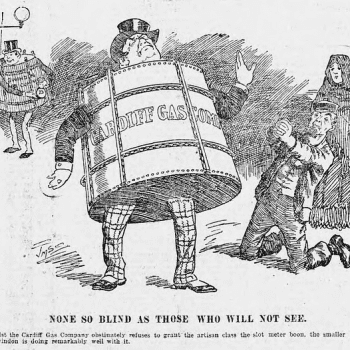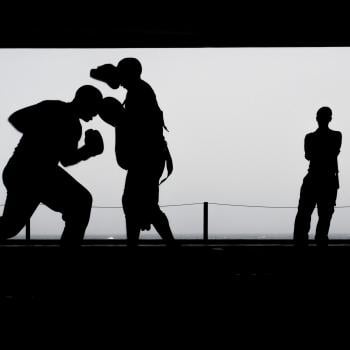Family legend has it that when Chaim Baron, a red-headed widower, emigrated to Britain from Belarus in the wake of pogroms in the 1880s, he tacked Cohen to his name to show his pride in being Jewish and his descent from the priestly Cohanim. Armed with his double-barreled surname, he settled in the Welsh capital of Cardiff with his second wife Amelia, whose father, an immigrant from Poland, had worked in a sweatshop in London’s East End.
Making his living as a jeweler, pawnbroker, and handyman, Chaim increased his brood from four to fifteen children, raising them in a “typically warm Orthodox Jewish home,” says his grandson Vivian Baron Cohen. Tall and vigorous at age 80 with a white mustache, Vivian is Erran and Sacha’s uncle, the brother of their father Gerald.
Vivian and Gerald are the offspring of Chaim and Amelia’s middle son, Moishe (Morris), whom Vivian describes as a raconteur with a great sense of humor. The two were born in Whitechapel, but, as World War II loomed, fled London with their parents. They moved in with their Yiddish-speaking grandparents in a small isolated laborer’s cottage about 25 miles from Cardiff, where the boys shared a bed. “I remember cooking a kosher chicken bought from a Cardiff butcher every Friday over an open fire,” says Vivian.
Morris found a job in a menswear shop and the family settled in Morganstown, on the northern outskirts of Cardiff. As Jews, the boys stood out. “I was the only Jew in my school, but unusual, as I was tall, blond and an athlete,” Vivian recalls. “I became school captain. [But] I got a lot of anti-Semitism from teachers. They would mock me about my math ability. When I was 11 years old, a teacher said, ‘You vant to buy a vatch? Go to Baron Cohen.’ It was very hurtful.”
Unlike the interwar years of the 1920s and 1930s, when newspaper advertisements for secretaries and clerks specified that Jews would not be hired, anti-Semitism took a more subtle form for Vivian’s generation as it entered the labor market after the war. Vivian encountered it in 1951 when he came to London after earning a degree in economics and English from the University of Wales. At an interview he was bluntly asked, “Which one of your parents wasn’t English?” As Vivian remembers: “I suddenly realized he meant ‘which one was Jewish.’ I said, ‘They’re both Jewish, and so am I,’ and I said, ‘Whatever job you’re going to offer, I’m not interested.’ And I got up and walked out of the room.”
I am talking to Vivian in his London menswear shop, Baron of Piccadilly, which he is closing after forty-five years of operation because the building is about to be demolished. Like many other Jews of their time, Vivian and Gerald ended up joining their father in the family business. The three built a thriving menswear retail company, Morris Cowan, with outlets in Cardiff and London. Vivian focused on merchandising while Gerald handled the bookkeeping. Their success made it possible for their children to receive first-rate educations and pursue riskier careers. Vivian’s son Ash, the Hollywood producer, has called his father and Uncle Gerald “creative rebels” -- a quality he believes rubbed off on him and his cousins.
Later, Vivian gives me a tour of his cozy brick and wood home designed by the famous British architect Edwin Lutyens in the prosperous, tree-lined Hampstead Garden Suburb, a predominantly Jewish neighborhood in north London. His wife Judith, who died in 2008, was from Montreal and was a therapist specializing in bereavement. The harp she played still stands in the living room, surrounded by sculpture and paintings, much of it by family members, and invitingly comfortable furniture with an informal, almost bohemian flair.
Gerald also found a creative woman. His wife, Daniella, is the daughter of a German Jew whose dream to become a dancer was destroyed by Hitler. Sacha has observed dryly that his grandmother, now 95, “was basically the last Jewish girl taught ballet in Germany.” Daniella, who grew up in Israel, followed in her mother’s footsteps by opening her own fitness studio. She is also a photographer.
Together the couples had eight children. Daniella and Gerald had three sons: Amnon, Erran, and Sacha. Judith and Vivian had five children, including Ash and Simon. The families were close and lived not far from each other within the safe comfortable confines of north London. Their homes were kosher, if not always strictly religious, with an emphasis on family and community -- and creativity. Simon recalls that his mother introduced dramatic performances and shadow puppetry into their Hanukkah celebrations and invited all the neighbors. “It was very much opening up Jewishness to be shared in the wider community: Chinese kids -- whoever we were friends with,” he says. “She would stretch a sheet across the living room and put lights behind it so you could act out the story of the Maccabees.”




